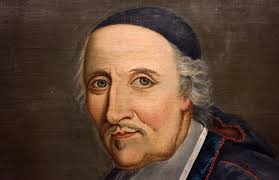HOMILY EASTER SEASON WEEK 03 04
Be Proclaimers and Evangelizers:
Memorial of St. Francois de Laval
(2 Tim 4.1-5; Ps 96; Jn 10.11-16)
******************************************
“Evangelizare pauperibus misit me – Pauperes evangelizantur.”
This phrase (“He has sent me to evangelize the poor – the poor are evangelized”) is the motto of the Oblates of Mary Immaculate, founded by St. Eugene de Mazenod. It was part of our daily prayer as Oblates in preparation for our General Chapter, and took on even greater significance during our 200th anniversary throughout 2016.
It fits well with the first reading and psalm today chosen for this memorial: “Proclaim the message,” “do the work of an evangelist,” and “Proclaim God’s marvelous deeds to all the nations.”
Essentially, by our baptism, we are all called to be evangelists – to proclaim the Good News to the world. The psalm puts it more poetically – we are to sing a new song, to tell of his salvation, to declare God’s glory among the nations.
Fr. Huber was an elderly crusty German Oblate priest at the Oblate Scholasticate in Battleford, one whom we would call a “character.” He was known to mutter in his broken English after a somewhat long homily by one of the priests in the community, “Vell den, vut does it all mean?”
We could ask the same question about the mandate to evangelize and proclaim the message – what exactly is the message – this Good News? What does it all mean for us?
It would have to begin with the resurrection of Jesus – he is truly risen from the dead. Sin, suffering, evil and even death has been overcome. We are forgiven and redeemed from our slavery to sin. We are free from any need to earn God’s love by slavishly keeping all kinds of laws, other than the law to love, for salvation and grace is a free gift. We can be healed of all our painful emotions like anger and bitterness, all our defects of character, shortcomings and negative attitudes like false pride, stubborn self-will and self-righteousness, and yes, even our addictions.
We don’t have to wait to “get to heaven” or even think we have to try to get there – when we believe in Jesus as Risen Lord, follow him and live his way, he who is the Way, Truth and Life, then we are already living in the kingdom of God here and now. That is why he came, after all – to inaugurate his kingdom in this world, so that we could live lives of peace, joy and justice today.
Part of the Good News is that Jesus accepts us as we are, and believes in who we can become. More than that, Jesus loves us in our brokenness and weakness and our poverty, and loves especially the poor, the lowly, the downtrodden, the oppressed and the marginalized.
Part of the sound doctrine that we are to proclaim is found in today’s gospel – Jesus is the Good Shepherd who lay down his life for us, his sheep, his flock, even when we were not worthy. He is love and he has loved us unconditionally, totally, to the end. He is God, Son of God, Savior, Redeemer, Healer, the Messiah who has come and will come again. How can we not respond but by faith, hope and love?
Our response is meant to be two-fold. The first is to strive to enter continuously into a more intimate relationship with him through prayer, meditation and contemplation, communing with him as he communed with the Father. That is what Jesus wants – to know us and to have us know him.
The second is to not keep this good news of our salvation to ourselves, but to try to share it with others to the best of our ability – to be evangelizers ourselves. We need to have the spirit of a little 6-year-old boy who, when finally convinced by his parents that Jesus was truly risen from the dead, ran eagerly to the phone exclaiming, “Does Grandpa know this? I gotta tell him!”

St Francois de Laval
A great example for us today is St. Francois de Laval, the first bishop of Quebec City. Born in France to a noble family, he was educated by the Jesuits and ordained a priest in 1647. After being ordained a bishop in 1658, he came to Canada (New France at that time). In 1663 he founded the Seminary of Quebec – now Laval University – to supply priests for his vast diocese that extended to all the French-speaking territory of North America! He later established a minor seminary and industrial school. Apparently, his pastoral concern for the settlers and the Indigenous people often resulted in conflict with local authorities, probably because he was standing up for their rights and needs over the selfish commercial desires of the local powers.
François was an outstanding educator and administrator, a generous benefactor, a caring bishop and a pious man whose spiritual influence was widespread. He well deserved his title of “Père de la Patrie” (Father of the Homeland) and was canonized in 2014.
The Eucharist we celebrate is an intimate meal and communing with Jesus our Risen Lord through Word and Sacrament. May it empower us to go, proclaim the message, do the work of an evangelist, and proclaim God’s marvelous deeds to all the nations. May we make our own these words addressed by St. Eugene to his Oblates: “Evangelizare pauperibus misit me – Pauperes evangelizantur.”



